澳大利亚商法Lecture 10 (Wk 11) Ant-Discrimination Law
澳大利亚商业法律
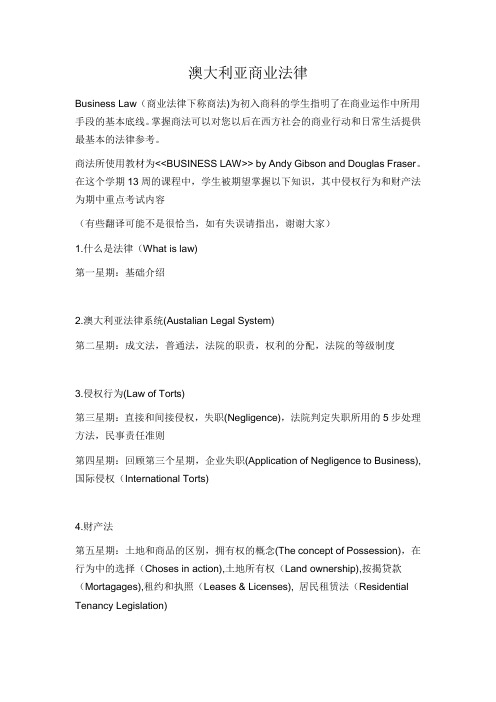
澳大利亚商业法律Business Law(商业法律下称商法)为初入商科的学生指明了在商业运作中所用手段的基本底线。
掌握商法可以对您以后在西方社会的商业行动和日常生活提供最基本的法律参考。
商法所使用教材为<<BUSINESS LAW>> by Andy Gibson and Douglas Fraser。
在这个学期13周的课程中,学生被期望掌握以下知识,其中侵权行为和财产法为期中重点考试内容(有些翻译可能不是很恰当,如有失误请指出,谢谢大家)1.什么是法律(What is law)第一星期:基础介绍2.澳大利亚法律系统(Austalian Legal System)第二星期:成文法,普通法,法院的职责,权利的分配,法院的等级制度3.侵权行为(Law of Torts)第三星期:直接和间接侵权,失职(Negligence),法院判定失职所用的5步处理方法,民事责任准则第四星期:回顾第三个星期,企业失职(Application of Negligence to Business), 国际侵权(International Torts)4.财产法第五星期:土地和商品的区别,拥有权的概念(The concept of Possession),在行为中的选择(Choses in action),土地所有权(Land ownership),按揭贷款(Mortagages),租约和执照(Leases & Licenses), 居民租赁法(Residential Tenancy Legislation)第六星期:复习,期中考试5.合同法(Contract Law)第七星期:介绍合同法,契约(Intention & Agreement)第八星期:合同团体数量(Capacity of the Parties)第九星期:真实许可(Genuine Consent)第十星期:合法对象和形式(Legality of Object & Form),合同的制定(Construction of the Contract)第十一星期:合同各方的权利(Rights of the parties & Discharge),毁约(Remedies for Breach of Contract)6.消费者保护立法(Consumer Protection Legislation)第十二星期:交易行为准则(Trade Practices Act 1974 Cth)7.经销法(Law of Agency)第十三星期:经销原则(Principle & Agent)次章所写时间为第三周,重点为侵权行为----在说某事简单的时候,请先将此事做完美。
澳洲企业规章制度大全英文
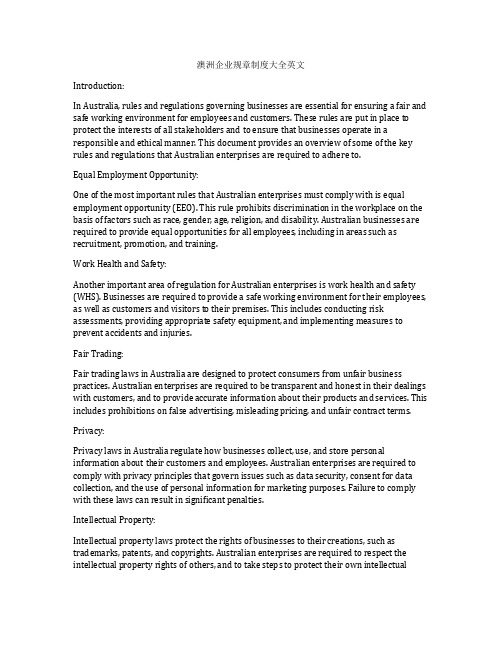
澳洲企业规章制度大全英文Introduction:In Australia, rules and regulations governing businesses are essential for ensuring a fair and safe working environment for employees and customers. These rules are put in place to protect the interests of all stakeholders and to ensure that businesses operate in a responsible and ethical manner. This document provides an overview of some of the key rules and regulations that Australian enterprises are required to adhere to.Equal Employment Opportunity:One of the most important rules that Australian enterprises must comply with is equal employment opportunity (EEO). This rule prohibits discrimination in the workplace on the basis of factors such as race, gender, age, religion, and disability. Australian businesses are required to provide equal opportunities for all employees, including in areas such as recruitment, promotion, and training.Work Health and Safety:Another important area of regulation for Australian enterprises is work health and safety (WHS). Businesses are required to provide a safe working environment for their employees, as well as customers and visitors to their premises. This includes conducting risk assessments, providing appropriate safety equipment, and implementing measures to prevent accidents and injuries.Fair Trading:Fair trading laws in Australia are designed to protect consumers from unfair business practices. Australian enterprises are required to be transparent and honest in their dealings with customers, and to provide accurate information about their products and services. This includes prohibitions on false advertising, misleading pricing, and unfair contract terms.Privacy:Privacy laws in Australia regulate how businesses collect, use, and store personal information about their customers and employees. Australian enterprises are required to comply with privacy principles that govern issues such as data security, consent for data collection, and the use of personal information for marketing purposes. Failure to comply with these laws can result in significant penalties.Intellectual Property:Intellectual property laws protect the rights of businesses to their creations, such as trademarks, patents, and copyrights. Australian enterprises are required to respect the intellectual property rights of others, and to take steps to protect their own intellectualproperty. This includes registering trademarks and patents, and taking action against infringements.Taxation:Australian enterprises are required to comply with taxation laws, including paying income tax, goods and services tax (GST), and other levies. Businesses must keep accurate records of their financial transactions and report their income to the Australian Taxation Office (ATO) in a timely manner. Failure to comply with taxation laws can result in financial penalties and legal action.Competition:Competition laws in Australia are designed to promote a fair and competitive market environment. Australian enterprises are prohibited from engaging in anti-competitive practices such as price-fixing, collusion, or abuse of market power. Businesses must also comply with rules governing mergers and acquisitions to prevent monopolies and protect consumer choice.Environmental:Australian enterprises are required to comply with environmental laws that regulate issues such as pollution, waste disposal, and conservation of natural resources. Businesses must seek to minimize their impact on the environment and to adopt sustainable practices wherever possible. Failure to comply with environmental laws can result in fines, legal action, and damage to a company's reputation.Conclusion:In conclusion, Australian enterprises are subject to a wide range of rules and regulations that govern their operations. By complying with these rules, businesses can ensure that they operate ethically and responsibly, while also protecting the interests of their stakeholders. It is essential for businesses to stay informed about changes to regulations and to seek legal advice when necessary to ensure compliance. Overall, adherence to rules and regulations is essential for the long-term success and sustainability of Australian enterprises.。
指澳大利亚公司法2001
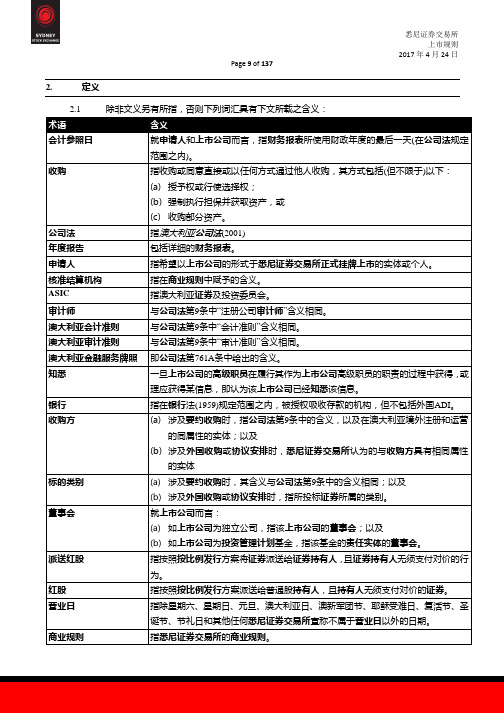
学科的学士学位及更高学历;
(b) 具备在石油工程、石油生产地质学或石油地质学方面至少五年的
实践经验,其中至少三年是和石油储量、条件潜在资源和远景资
源的评估和估算相关;以及
是行业内专业的工程师、地质学家或其他地质学科学家组织的杰
出成员,其专业实践包括石油储量、条件潜在资源和远景资源的
评估和/或审计。专业组织必须:
术语
等值国际估算 同等效力的国际准则 托管期 评估日期 除权 勘探 提取 收费标准 金融服务牌照持牌人 财务报表
固定收益证券
Page 12 of 137
悉尼证券交易所 上市规则
2017 年 4 月 24 日
含义 (e) 可转换为上述(a)、(b)两条所涵盖的证券的金融产品;以及 (f) 任何悉尼证券交易所划分为股本证券的证券。 但不包括任何悉尼证券交易所划分为固定收益证券的证券。 按照同等效力的国际准则做出的国际估算或是悉尼证券交易所可接受的国际估算。
市场价格
就上市证券而言,指交易系统营业日结束收盘时显示的最近销售价格。
McfGEs
千立方英尺的气体当量。
持有的矿产 资源量和 矿 上市公司及其控股实体在矿产资源量和矿石储量中的总体经济利益
石储量
矿物
是指所有的固体矿物,包括钻石、其他宝石、工业矿物和煤,但不包括石油。
(a) 授予权或行使选择权;
(b) 强制执行担保并获取资产,或
(c) 收购部分资产。
公司法
指澳大利亚公司法(2001)
年度报告
包括详细的财务报表。
申请人
指希望以上市公司的形式于悉尼证券交易所正式挂牌上市的实体或个人。
核准结算机构
指在商业规则中赋予的含义。
ASIC
澳洲商法课件Week One Lecture

About the unit – Brief description
> What is Business Law? – Law relating to the rights, duties and obligations of persons who have agreed to enter into a business relationship.
– Consultation Time: Wednesday, 12 -1pm – Goal is to make your learning experience, as much as possible, a
fulfilling and enjoyable one
Unit Coordinator/Lecturer
> To locate and apply to fact situations the relevant legal principles relating to this field of study and, in relation to a problem calling for advice to a client about business law, to compose a legal opinion which applies the appropriate laws.
business – the basic skills of case (judicial decisions) analysis and problem
solving and statutory interpretation
Learning objectives
> To analyse cases and interpret statutory provisions relevant to this field of study and apply them appropriately to facts.
澳洲广播电台商业英语教程PDF文本all-pdf
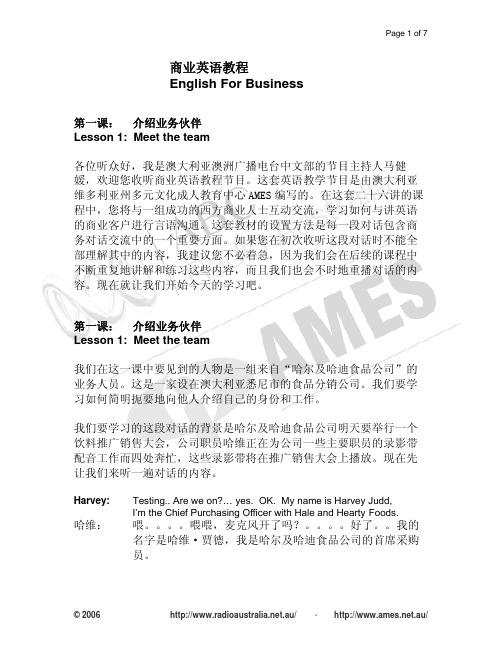
商业英语教程English For Business第一课:介绍业务伙伴Lesson 1: Meet the team各位听众好,我是澳大利亚澳洲广播电台中文部的节目主持人马健媛,欢迎您收听商业英语教程节目。
这套英语教学节目是由澳大利亚维多利亚州多元文化成人教育中心AMES编写的。
在这套二十六讲的课程中,您将与一组成功的西方商业人士互动交流,学习如何与讲英语的商业客户进行言语沟通。
这套教材的设置方法是每一段对话包含商务对话交流中的一个重要方面。
如果您在初次收听这段对话时不能全部理解其中的内容,我建议您不必着急,因为我们会在后续的课程中不断重复地讲解和练习这些内容,而且我们也会不时地重播对话的内容。
现在就让我们开始今天的学习吧。
第一课:介绍业务伙伴Lesson 1: Meet the team我们在这一课中要见到的人物是一组来自“哈尔及哈迪食品公司”的业务人员。
这是一家设在澳大利亚悉尼市的食品分销公司。
我们要学习如何简明扼要地向他人介绍自己的身份和工作。
我们要学习的这段对话的背景是哈尔及哈迪食品公司明天要举行一个饮料推广销售大会,公司职员哈维正在为公司一些主要职员的录影带配音工作而四处奔忙,这些录影带将在推广销售大会上播放。
现在先让我们来听一遍对话的内容。
Harvey:Testing.. Are we on?… yes. OK. My name is Harvey Judd, I’m the Chief Purchasing Officer with Hale and Hearty F oods.哈维: 喂。
喂喂,麦克风开了吗?。
好了。
我的名字是哈维·贾德,我是哈尔及哈迪食品公司的首席采购员。
Harvey:I’m responsible for finding new products for the company to sell. 哈维: 我的职责是为公司找到可以推销的新产品。
Harvey: Today I’m going to introduce to you my colleagues in theInternational department, that is if I can get anyone to speak tome, everyone’s so flat out…哈维: 今天我要向各位介绍我在公司国际部的几位同事,不过我先要看看是否能够找到人,现在大家都是忙得不亦乐乎。
澳大利亚电子商务法律框架

Australia's legal framework on electronic commerce澳大利亚电子商务法律框架Enacting the Commonwealth Electronic Transactions Act 1999 was a major step towards supporting and encouraging the development of electronic commerce in Australia. It contains rules applying to the interpretation of other legislation.1999年《联邦电子交易法》的公布是支持和提倡澳洲电子商务发展的重大举措。
此法中所包括的条例可适用于论述其他法规。
Basically, it states that a transaction under a law of the Commonwealth will not be invalid simply because it was conducted by the use of electronic communications.The Electronic Transactions Act allows any of the following requirements or permissions under Commonwealth law to be fulfilled in electronic form:按照此法所示, 由电子通信达到的交易大体上是具有联邦法律效益的。
依据《联邦电子交易法》,以下任何一种要求或许可,都可通过电子形式来完成。
Giving information in writing提供书面信息Providing a handwritten signature提供亲笔签字Producing a document in material form, and提交材料文件Recording or retaining information.记录和保留信息The implementation of the Electronic Transactions Act was in two stages:电子交易法的实施分为两个阶段:Before 1 July 2001 it only applied to those laws of the Commonwealth that were specified in the Electronic Transactions Regulations 2000.在2001年7月1日之前,电子交易法只适用在2000年公布的电子交易条例中所指出的联邦法。
澳大利亚电子交易法
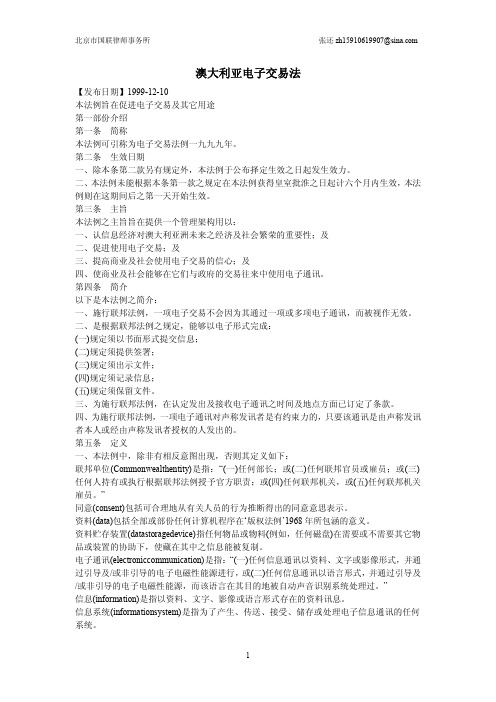
澳大利亚电子交易法【发布日期】1999-12-10本法例旨在促进电子交易及其它用途第一部份介绍第一条简称本法例可引称为电子交易法例一九九九年。
第二条生效日期一、除本条第二款另有规定外,本法例于公布择定生效之日起发生效力。
二、本法例未能根据本条第一款之规定在本法例获得皇室批淮之日起计六个月内生效,本法例则在这期间后之第一天开始生效。
第三条主旨本法例之主旨旨在提供一个管理架构用以:一、认信息经济对澳大利亚洲未来之经济及社会繁荣的重要性;及二、促进使用电子交易;及三、提高商业及社会使用电子交易的信心;及四、使商业及社会能够在它们与政府的交易往来中使用电子通讯。
第四条简介以下是本法例之简介:一、施行联邦法例,一项电子交易不会因为其通过一项或多项电子通讯,而被视作无效。
二、是根据联邦法例之规定,能够以电子形式完成:(一)规定须以书面形式提交信息;(二)规定须提供签署;(三)规定须出示文件;(四)规定须记录信息;(五)规定须保留文件。
三、为施行联邦法例,在认定发出及接收电子通讯之时间及地点方面已订定了条款。
四、为施行联邦法例,一项电子通讯对声称发讯者是有约束力的,只要该通讯是由声称发讯者本人或经由声称发讯者授权的人发出的。
第五条定义一、本法例中,除非有相反意图出现,否则其定义如下:联邦单位(Commonwealthentity)是指:“(一)任何部长;或(二)任何联邦官员或雇员;或(三)任何人持有或执行根据联邦法例授予官方职责;或(四)任何联邦机关,或(五)任何联邦机关雇员。
”同意(consent)包括可合理地从有关人员的行为推断得出的同意意思表示。
资料(data)包括全部或部份任何计算机程序在‘版权法例’1968年所包涵的意义。
资料贮存装置(datastoragedevice)指任何物品或物料(例如,任何磁盘)在需要或不需要其它物品或装置的协助下,使藏在其中之信息能被复制。
电子通讯(electroniccommunication)是指:“(一)任何信息通讯以资料、文字或影像形式,并通过引导及/或非引导的电子电磁性能源进行,或(二)任何信息通讯以语言形式,并通过引导及/或非引导的电子电磁性能源,而该语言在其目的地被自动声音识别系统处理过。
澳大利亚商业银行风险管理共22页文档

7.2 Implementing Basel II – Australia’s
experience (continued)
澳洲实施新巴塞尔协议的经验(续)
• Australian internationally active banks (7 banks) seeking advanced internal rating based status (AIRB) for credit risk and the advanced measurement approach (AMA) for operational risk 澳洲国际活跃银行( 7家)采用高级内部评级法 来衡量信用风险,采用进阶衡量法来计量操作风 险
7
4.2 Australia - financial regulatory approach
(continued) 澳洲金融监管体制(续)
• Reserve Bank of Australia (RBA) – central bank,
responsible for 澳大利亚储备银行-中央银行
- monetary policy 制定货币政策 - systemic stability 维持金融系统的稳定 - payments system 建立并维护支付系统
- skilled board, management and staff 专业的董事会、管理层和员工
- constructive public discussion to remove regulatory overlap 展开建设性的公众讨论以消除重复监管
12
7. Implementing Basel II – Australia’s
• Banks support Basel II 银行支持新巴塞尔协议 - aligns supervisory arrangement with credit rating and processes in operation in most major banks for last 10 years or so 10多年来,一直在监管措施与银行的信用评级和操作流
- 1、下载文档前请自行甄别文档内容的完整性,平台不提供额外的编辑、内容补充、找答案等附加服务。
- 2、"仅部分预览"的文档,不可在线预览部分如存在完整性等问题,可反馈申请退款(可完整预览的文档不适用该条件!)。
- 3、如文档侵犯您的权益,请联系客服反馈,我们会尽快为您处理(人工客服工作时间:9:00-18:30)。
Both (in different ways) attempt to ensure that all individuals are judged according to their personal skills and merit.
2007PPP – Legal Issues for Managers
Module 4 – Legal Obligations of Managers Week 11 – Anti-Discrimination Law
1
Quick Questions
Which of the following questions are acceptable/ unacceptable for an employer to ask a job applicant?
Why/Why Not?
How old are you? Do you have children at home? Have you ever been convicted of a driving offence? Do you have a criminal conviction? Are there any languages you speak fluently? If so, what are they? Are you able to travel one week every month? Can you give me a small photo of yourself to accompany this application?
Commonwealth (Federal) Anti-Discrimination - Legislation
Commonwealth (Cth) Acts
Human Rights & Equal Opportunity Act 1986 Racial Discrimination Act 1975 Sex Discrimination Act 1984 Disability Discrimination Act 1992 Age Discrimination Act 2004 Equal Employment Opportunity (Commonwealth Authorities) Act 1987 Public Service Act 1999 Equal Opportunity for Women in the Workplace Act 1999 Workplace Relations Act 1996
3
Equal Employment Opportunity Defined
Equal Opportunity Legislation in the workplace (such as EOWA) promotes the idea that all employees should have equal access to opportunities at work – proactive. Positive obligations on Employers – such as an Affirmative Action Program – Report.
4
Human Rights Based - Regulations
Anti-discrimination and Equal Employment Opportunity are both about trying to ensure that no unlawful discrimination occurs in employment and are both based on international obligations.
7
Bullying
Bullying may create a cause of action via another means under the various AntiDiscrimination Acts.
For example:
If bullying is on the basis of a protected attribute, it could amount to discrimination, sexual harassment, victimisation, or vilification. Must prove connection between the attribute and the treatment; or It could be linked to Victimisation.
2
Anti-Discrimination Defined
Anti-discrimination legislation focuses upon
what conduct constitutes “unlawful discrimination” = prohi源自ited conduct.
Anti Discrimination legislation applies to conduct which has already occurred or which is likely to occur (proposed) and
Genuine application of the merit principle in employment.
/eowa-namescompanies-that-failed-women-in-the-workplace/
Anti-Discrimination Legislation:
Covering such aspects of employment as recruitment, selection, conditions of employment, promotion, termination, transfer, training, dealings with employment agencies, trade union membership, job advertisements, equal opportunity and sexual harassment. Discrimination may be: Direct; or Indirect.
(a) temporary absence from work because of illness or injury within the meaning of the regulations; (b) trade union membership or participation in trade union activities outside working hours or, with the employer’s consent, during working hours; (c) non-membership of a trade union; (d)seeking office as, or acting or having acted in the capacity of, a representative of employees; (e) the filing of a complaint, or the participation in proceedings, against an employer involving alleged violation of laws or regulations or recourse to competent administrative authorities; (f) race, colour, sex, sexual preference, age, physical or mental disability, marital status, family responsibilities, pregnancy, religion, political opinion, national extraction or social origin; (g) refusing to negotiate in connection with, make, sign, extend, vary or terminate an ITEA; (h) absence from work during maternity leave or other parental leave; (i) temporary absence from work because of the carrying out of a voluntary emergency management activity, where the absence is reasonable having regard to all the circumstances. 11
10
Workplace Relations Act 1996 (Cth) s.659 UNLAWFUL TERMINATION - (Discriminatory Reasons)
An employer must not terminate an employee’s employment for any one or more of the following reasons, or for reasons including any one or more of the following reasons: on the basis of:- s659
Anti-Discrimination Legislation also covers other areas such as the supply of goods and services.
